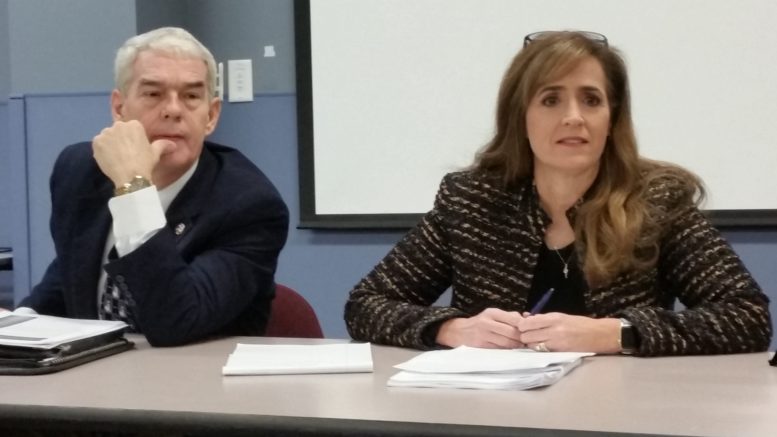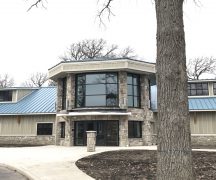By JAN LARSON McLAUGHLIN
BG Independent News
State Sen. Randy Gardner and State Rep. Theresa Gavarone on Thursday talked about legislation aimed at school funding, violent criminals, drug trafficking, communication disabilities, and abandoned wells. All are efforts to make life better for Ohioans.
But some local citizens wanted to know when the next cut in state funding was going to hit. Why was the state taking a share of municipal business income taxes? When can local governments expect state funding to be decreased again?
And why are legislators focusing on issues that affect a small number of individuals when they ought to be tackling the big issues of education, health care, jobs and the economy?
Gardner and Gavarone met with members of the Bowling Green Chamber of Commerce on Thursday to present a legislative update.
“Some of our best suggestions come from meetings like this,” Gardner said.
First, the state legislators talked about some of their successes this past year:
School funding on a smaller scale
Senate Bill 8 allows school districts to get up to $1 million in state funding for items such as technology expenses, roof repairs, school safety or adding a classroom. The legislature is designed to help districts – like Bowling Green – which are too wealthy to get much state help for major building projects, Gardner said.
Districts are not likely to participate in the school facilities funding program if the state share is 20 percent or less. “For those kind of districts, they’re not likely to accept the strings attached,” Gardner said.
So this bill allows districts to access state funds for smaller expenses. “It is now law and available to school districts,” Gardner said. “A district like Bowling Green may be a strong candidate some day.”
Sierah’s Law
Senate Bill 231 was made into law after Sierah Joughin, a college student from Metamora, was murdered in 2016 by a man who had committed similar crimes in the past. The bill puts into place a law enforcement data base of people convicted of kidnapping and other violent crimes. Ohioans have long been able to find out if sex offenders live near them, but there has been no such data base for violent felons.
“If law enforcement doesn’t know, the public doesn’t know,” Gardner said. “Sometimes minutes or hours matter.”
Communicating for those unable to themselves
House Bill 115 came about after a Walbridge woman shared with Gavarone concerns about her son who has autism and is able to drive. She worried that if her son was pulled over by law enforcement he might not respond appropriately to the officer.
So the legislation sets up a voluntary registry for people who have communication disabilities. The confidential data base would alert law enforcement if they pull someone over with problems communicating, Gavarone explained.
Giving addicts a better chance to quit
House Bill 296 would increase the level of the offense for people trafficking drugs near a drug rehabilitation center. Gavarone said the legislation came about after a discussion with Wood County Prosecuting Attorney Paul Dobson.
“Drug traffickers know their market,” so they see rehab facilities as ripe with potential customers, she said. This change would give addicts trying to kick their habits a better chance to succeed. “When people take that step,” they are most vulnerable, Gavarone said.
Taking care of old wells
Gavarone is co-sponsoring a bill aimed at getting idle orphaned and abandoned wells plugged and sealed.
“There are thousands of abandoned and orphaned wells across Ohio,” she said. The legislation would set up a process for reporting, prioritizing and getting the wells sealed.
“Wood County has a lot of that,” with many wells abandoned after the oil boom in the region, Gardner said.
Then the legislative update turned to questions from chamber members.
Don’t skip the big things
Lee Hakel voiced her concern that the legislature seems to focus on small “one-person issues,” rather than tackling the tough topics of school funding and health care.
Gavarone replied that meeting with constituents who have ideas for legislation is part of her job. Hakel didn’t dispute that, but said there is also a need to address bigger issues.
“How do we get the big items on the agenda,” Hakel asked.
Gardner said topics that may start out as one-person issues sometimes end up touching many more lives. He talked about a conversation with a Bowling Green physician at a Kiwanis pancake breakfast in 1999, which resulted in legislation allowing students with asthma to carry their inhalers at school.
Gardner also mentioned a Rossford woman who shared her concern that poor vision was causing some Rossford students to do poorly at school. That resulted in a bill requiring young students to get eye exams.
State skimming off of local tax revenue
Mayors of Bowling Green and Pemberville shared their wrath over the state’s decision to take over the collection of municipal income taxes for businesses that sign up.
“That’s very vital to small communities,” Pemberville Mayor Gordon Bowman said.
“There’s no question it’s a concern for villages and cities,” Gardner agreed.
But Gardner went on to explain that the initial plan was for the state to take over all income tax collections for municipalities. That was later changed to just include businesses that voluntarily sign up. That change actually makes sense for businesses that have locations in multiple different municipalities, Gardner said.
“This ought to be more tax friendly to businesses,” without hurting municipalities too much, he said. “We’ve got to respect business and private sector needs.”
But Bowman still wasn’t sold.
“The state doesn’t deserve to take this over,” he said, noting a lawsuit filed by many Ohio municipalities challenging the state. “There’s going to be a real fight here.”
Bowling Green Mayor Dick Edwards said there is a bigger picture problem. “We’re more concerned about the mindset” that state officials seem to have toward local government. “They are taking away local authority.”
The cutting of local funds from the state is harming the ability of cities and towns to function on behalf of their citizens, Edwards said.
“Every time we turn around,” the state is taking more funding or authority away, he said. “I worry about this overall mindset.”
What’s coming next from the state?
Citizen Frances Brent voiced her concerns about continued attacks on local funding. “They keep coming in waves,” affecting libraries, schools and local government, she said.
“What dangers are ahead for us as a community” in the form of reduced funding, Brent asked Gardner and Gavarone.
Both legislators said efforts are in place to help local governments with funding, such as a bridge partnership program. But those bills don’t always get much publicity, Gardner said.
“I’ve always believed local government” and the state are partners, Gardner said.
Net neutrality
Though it appears that states may be powerless on this issue, Gardner said, “I think it’s going to infringe upon the free access.” Wood County District Public Library Director Michael Penrod said the library community is quite concerned about the change. “Maybe the states need to take a stance,” he said.





